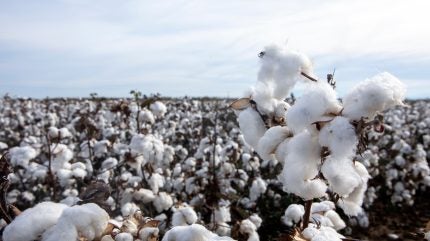
The CottonConnect and CDB collaboration also aims to improve the quality of cotton production in Bangladesh while fostering environmentally responsible methods.
The two partners signed a memorandum of understanding (MoU) which “establishes a cooperative framework aimed at boosting cotton research, promoting sustainable farming practices, enhancing fibre quality, and creating a transparent, traceable supply chain”.

Discover B2B Marketing That Performs
Combine business intelligence and editorial excellence to reach engaged professionals across 36 leading media platforms.
The partnership seeks to connect farmers with brands and consumers to enhance the cotton supply chain and aims to introduce regenerative farming techniques for ecological benefits.
The partnership aims to ensure farmers have better working conditions, fair pay, and sustainability training, as well as focus efforts on improving cotton fibre quality through sustainable practices.
The initiative also plans to establish a traceable supply chain with effective data collection systems and investigate applications for cotton in high-value products by developing climate-resilient farming methods.
Cotton Development Board executive director Md Rezaul Amin said: “By focusing on farmer empowerment, climate resilience, technological innovation, and market diversification, the MoU promises to benefit both producers and consumers while contributing to environmental stewardship.

US Tariffs are shifting - will you react or anticipate?
Don’t let policy changes catch you off guard. Stay proactive with real-time data and expert analysis.
By GlobalData“Its emphasis on knowledge exchange, capacity building, and joint projects positions it as a catalyst for long-term growth, improved farmer livelihoods, and stronger global market presence for Bangladeshi cotton.”
Based in London, CottonConnect focuses on reforming cotton supply chains to be more sustainable, transparent, and equitable.
The organisation has a presence in Europe, South Asia, and China, with expertise spanning farm management, value chain operations, and textile industry knowledge.
The CDB is a governmental body established in 1972 with the mandate to promote cotton cultivation in Bangladesh.
Currently, Bangladesh has about 60,000 farmers cultivating cotton in 39 districts.
The nation is set to stay at the forefront of cotton importers, accounting for 19% of global imports, as per the International Cotton Advisory Committee (ICAC).
The alliance between CottonConnect and the CDB aims to leverage CottonConnect’s international experience in sustainable cotton supply chains with the CDB’s commitment to cotton research and development.
CottonConnect CEO Alison Ward said: “This collaboration is a major step forward in aligning Bangladesh’s cotton sector with global sustainability and quality benchmarks. By integrating cotton improvements with the country’s powerful garment industry, we are creating a future where Bangladeshi cotton is not only competitive but also ethically and environmentally sound.”





